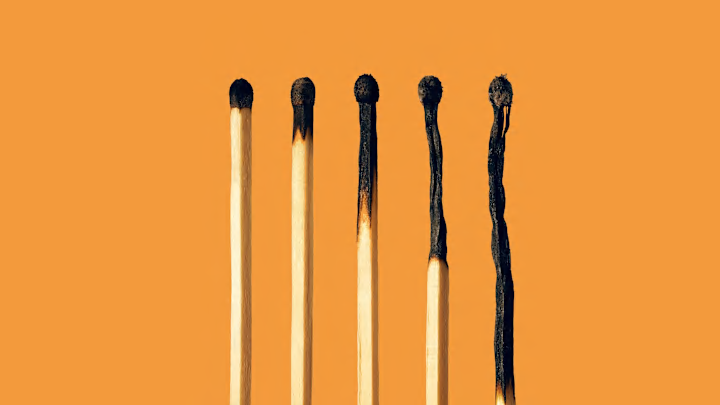Burnout in the workplace is a big conversation starter these days, but the concept itself is not exactly new: According to Merriam-Webster, the term burned out (which refers to feeling totally worn out or exhausted), dates back to the early 19th century and people have had other names for it for much longer than that. Here are just a few ways folks have described feeling burned out throughout history.
1. Amate
According to the Oxford English Dictionary, this 15th-century word means “overwhelmed; exhausted; disheartened, dismayed.” Yup, sounds like burnout!
2. Aweary
You can probably feel this one in your bones: Aweary is a word for exhaustion dating back to the 16th century. Shakespeare used it (Macbeth says, “I ’gin to be aweary of the sun / And wish th’ estate o’ th’ world were now undone”), as did Tennyson (“I am aweary, aweary, I would that I were dead!” the poet wrote in “Mariana”).
3. Bezzled
This 17th-century word, which means “worn out, exhausted,” is sometimes spelled beazled, as in this citation from 1875’s A Dictionary of the Sussex Dialect: “He comes home tired of an evening, but not beazled like boys who go to plough.”
4. Burn Up
In addition to burned out, there was burn up; Green’s Dictionary of Slang dates this usage to 1927.
5. Defatigate
This 15th-century adjective is derived from the Latin dēfatīgātus, meaning “to exhaust in mind and body.”
6. Fragged Out
According to The New Partridge Dictionary of Slang and Unconventional English, this slang term meaning “overstressed” is used in the UK but has its roots in the U.S. military; fragged is short for “fragmentation.”
7. To a Frazzle
In the 19th century, to frazzle something meant to wear it out. The phrase to a frazzle was used to describe what Merriam-Webster calls “a condition of fatigue or nervous exhaustion,” and it seems to have a been a favorite of Theodore Roosevelt, who used it to describe political battles and their ensuing outcomes. “We’ve got ‘em beaten to a frazzle,” he said of the Democrats in 1908. “I beat the Old Guard to a frazzle,” he noted in 1910, driving the point home the next day: “I said frazzle you may recall, and you may quote me on that.”
8. Overcark
This obsolete term from the 14th century means “overwork.” According to the OED, it was created by combining the word over with the word cark, meaning “that which burdens the spirit, trouble; hence, troubled state of mind, distress, anxiety; anxious solicitude, labor, or toil.”
9. Overtoil
Similarly, overtoil is a 19th-century term for being worked too hard. “The stoop in the shoulders so universal among them merely means over-toil in the workroom,” George Gissing wrote in his 1889 novel The Nether World.
10. Powfagged
This word hails from 19th century northwestern England and means “extremely tired; physically or mentally exhausted,” according to the OED. It was formed by combining pow (a variant of the word poll, which usually refers to the top of an animal’s head) and the 18th-century adjective fagged, meaning “extremely tired.”
11. Predone
An obsolete term from the 1850s, predone is best defined using a quote from Charles Kingsley’s Letters and Memories of His Life: “I am as one desperate and pre-done with work of various kinds at once.”
12. Stressy
This colloquialism from early 20th century England, Australia, and New Zealand is for describing a stressful situation. (The OED has usages citing “stressy days” and “stressy jobs.”) Later, it came to be used to reference a person who was “experiencing or displaying mental or emotional strain or tension,” according to the OED.
13. Teesick
This 1920s Scots term means “an illness due to overwork, a breakdown,” according to the Scottish National Dictionary. That’s burnout ... to a tee.
